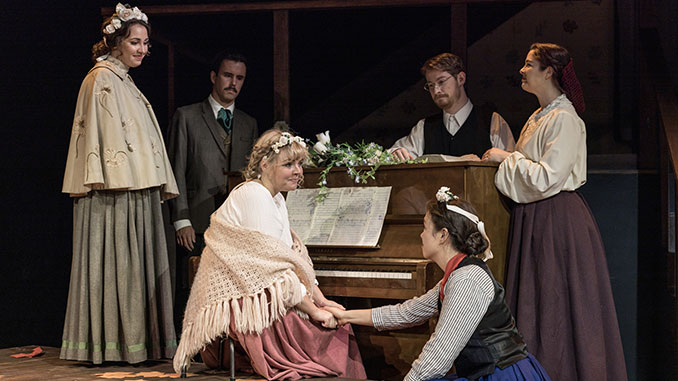 American writer Louisa May Alcott’s widely known title, Little Women, has provided the story for an extraordinary long list of adaptations, including those for stage plays, film, television, audio dramas and musicals.
American writer Louisa May Alcott’s widely known title, Little Women, has provided the story for an extraordinary long list of adaptations, including those for stage plays, film, television, audio dramas and musicals.
In hindsight, it doesn’t seem surprising that it would eventually be transformed into an opera. That occurred in 1998, materialising from a commission awarded to American composer Mark Adamo for Houston Grand Opera. His first opera, Adamo was just 35 years old when it premiered. It is now one of the most frequently performed American operas of the century.
Since its Australian premiere at the State Opera of South Australia in 2007, Little Women had not been staged in the country until, for some fortunate few, it revealed its generous appeal and underlying lesson in a thoughtfully conceived and evocatively staged production by students of the Melbourne Conservatorium of Music, Victorian College of the Arts.
As both composer and librettist, Adamo gives compelling operatic agency to Alcott’s tale in an intelligently focused adaptation that effortlessly coasts through poignant introspection, playful connections and pivotal events.
A memory play of sorts, it begins in the attic of the March family home as the opera’s central dramatic conflict of resistance to change is established by second sister Jo’s musings, “Perfect as it was.”
Not so much a coming of age story as a coming to terms one, Jo’s words resonate in a series of keenly threaded flashbacks over prologue and two acts, countered by the underlying truth about the passage of time that, as eldest sister Meg informs, “Things change, Jo.”
The prologue and first act traverse a satisfying arc, dare I say enough for it to stand alone as a short work. The second act intriguingly keeps one wondering if or when resolution can be achieved.
The libretto is written in rhymed couplets combined with judiciously employed music both lyrical and dissonant. And it bristled with purpose and quality thanks to an astute sense of dramatic sensitivity from director Alexander Lewis and excellent, well-studied performances from the school’s students.
Adamo’s fully orchestrated score will have enabled and revealed a broader spectrum but the music nevertheless reverberated with multi-faceted colour and depth from two pianos under music director Thomas Griffiths and Donald Nicolson.
The opera’s enriching simultaneously occurring actions across different settings held a particularly powerful place in the performance, as did the spirited life given to Jo by young mezzo soprano Syrah Torii.
Assured in voice and singing with tones of variously shaded but not too dark expressive weight, Torii took the challenging tug of war demands of the central character and turned them convincingly into a young women establishing her own identity against the determination to hold onto what she most loved about life.
Along with Torii, the sisters’ distinct personalities were rendered with engaging strength. Lucy Schneider’s exquisitely rich and expressive soprano was a smart match for Meg’s natural romantic and maturing course.
Elegantly fine soprano Shania Eliassen was a radiant presence as spoiled Amy and robust soprano Sophie Bisset didn’t hold back on giving ailing homebound Beth a little tour de force in her dying moments.
As Laurie, Jo’s first heart-to-heart young male companion, intricately textured tenor Ben Glover was an absolute joy to listen to, imbuing the privileged lad with easy-going charm and wit with impressive timbre and range.
Warm baritone Nick Sheppard put in a dignified performance as Meg’s love, John Brooke. A foundation-firm James Emerson projected ample sincerity both as the girls’ father and as Jo’s ultimate love, Friedrich Baer, and Miriam Whiting-Reilly stacked decades on her age commendably with penetrating voice and stiff and icy entitlement as the girls’s rich and uncongenial aunt, Cecilia.
Praise is also deserved for the remaining cast with Caitlin Rowe as the mother, Jack Jordan as Dashwood and the chorus quartet of Eliza Bennetts O’Connor, Amanda Hargreaves, Jessica Cleave and Kristin Astouroghlian.
Grace Mallinson’s stage design, incorporating two foreground platforms and a rear-rising gabled attic and deck-like front, was highly effective along with costumes that pointed to the 19th century and tastefully augmented lighting.
Overall, the sum of all the parts was entirely conducive to and worthy of Adamo’s work.
My only quibble is that, with Jo walking hand in hand with Friedrich Baer into the diminishing light at the end, her part in addressing change might only be perceived as requiring a man at her side.
Alcott’s tale indeed concerns growing up female in post-Civil War New England. Adamo’s adaptation, on the other hand, almost erases specifics of time and place, thereby providing, not only greater access but a different suggested outcome to go with it.
And finally, in a thought alluding to the first scene of Act 1, I wanted to ask the artists, “Where do you want to see yourselves in 5 years?” You want them to answer, “On the stage where I know I can make a difference.” Indeed, they have the capacity to do so.
Little Women
Grant Street Theatre, Grant Street, Southbank
Performance: Friday 10 December 2021
Information: www.finearts-music.unimelb.edu.au
Image: Little Women – photo by Ben Fon
Review: Paul Selar
